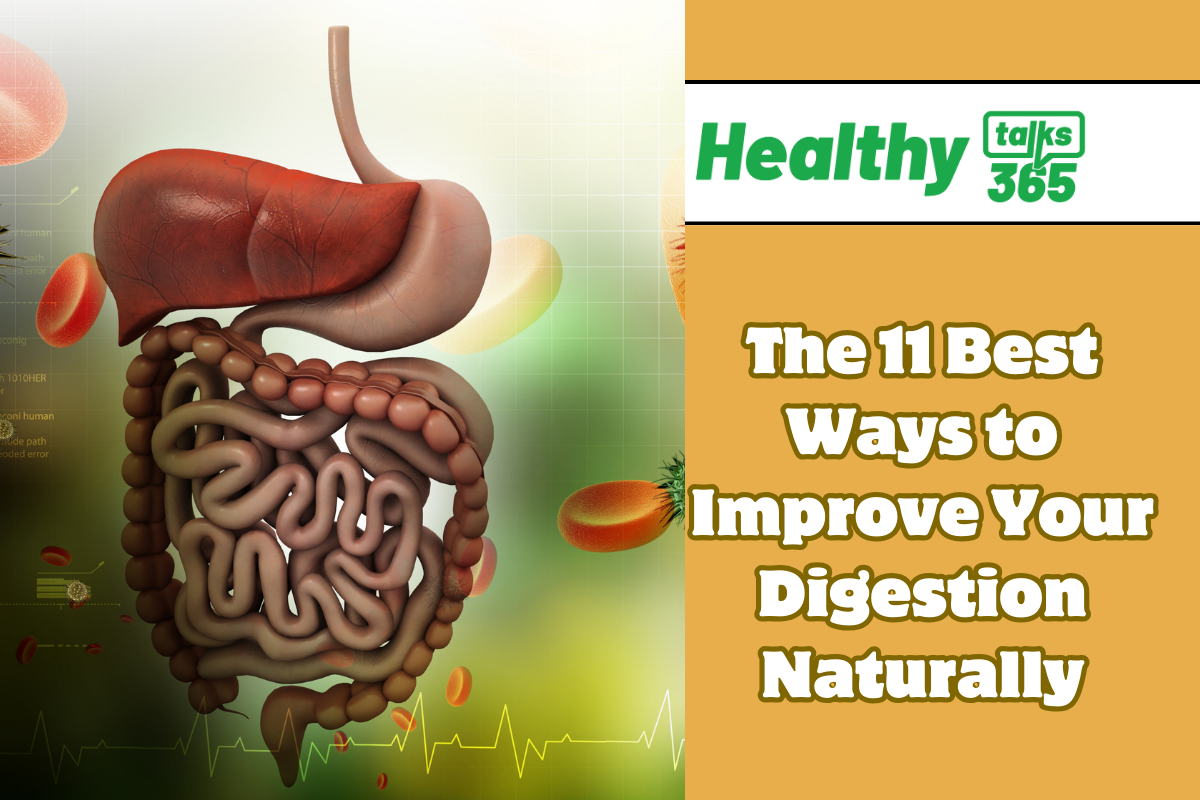The 11 Best Ways to Improve Your Digestion Naturally
1. Eat the right foods to improve gut health
Eating the right foods is super important for making our tummies happy and healthy. When we eat foods that are good for our tummies, it helps the tiny organisms inside called bacteria to stay healthy too. These bacteria do lots of important jobs, like helping us digest food and keeping us from getting sick.
So, what are the right foods? Foods that are high in fiber, like fruits, veggies, whole grains, and beans, are great for our tummies. They give the bacteria in our gut the energy they need to do their job well. Also, foods like yogurt, kefir, sauerkraut, and kimchi are awesome because they have good bacteria in them that help our tummies stay balanced.

Read Also:
11 Best Ways to Improve Your Digestion
2. Take stress management classes
Taking classes to learn how to manage stress can really help you feel better. When we’re stressed out, it can make us feel angry and upset, which isn’t good for our health.
By learning how to manage stress, we can learn ways to stay calm and handle tough situations better. These classes teach us simple techniques like breathing exercises and mindfulness, which can help us feel more relaxed and in control.
3. Pay attention to your daily routine for better gut health
Paying attention to your daily routine is important for keeping your gut healthy. Simple things like what you eat, how much you move, and how you handle stress can affect the balance of good bacteria in your gut.
First, eating a balanced diet with lots of fruits, veggies, whole grains, and fermented foods helps your gut bacteria stay happy. Avoiding processed foods and sugary snacks is also a good idea because they can mess up the balance of bacteria in your gut. Second, staying active by exercising regularly helps your digestion and reduces stress, which is good for your gut health too.
Read Also:
Pregnancy: Signs, Symptoms, Overview, Health Tips You Should Know
4. Chew your food thoroughly
It’s a good idea to chew your food really well and eat slowly if you want your digestion to work well. When you chew your food thoroughly and take your time eating, it helps your stomach break down the food more easily.
This makes it easier for your body to absorb all the nutrients from the food and helps prevent problems like bloating and gas. Plus, eating slowly and chewing your food well can also help you feel more satisfied and prevent overeating.
5. Limit processed food
It’s a good idea to not eat too many processed foods, sugary stuff, and artificial additives. These things can mess up your digestion and make your stomach feel uncomfortable. When you eat a lot of processed foods, refined sugars, and artificial additives, it can upset the balance of good bacteria in your gut and lead to digestive problems like bloating, gas, and stomach pain.
So, it’s best to limit your intake of these foods and focus on eating more natural, whole foods like fruits, veggies, whole grains, and lean proteins. This way, you can help keep your digestion running smoothly and avoid any tummy troubles.

6. Use herbals
Try adding herbal teas like peppermint, ginger, or chamomile to your daily routine. They can help calm your stomach when it feels upset and make you feel more relaxed.
Peppermint tea has a refreshing taste and can ease tummy troubles like bloating or gas. Ginger tea has a spicy kick and is great for soothing nausea or indigestion. Chamomile tea has a gentle flavor and can help you unwind after a long day.
Read Also:
7. Include gentle exercises in routine
Adding easy exercises like walking or yoga to your daily routine after you eat can help your body digest food better. It stops you from feeling tired and heavy after meals.
Walking is a simple exercise that gets your body moving and helps food move through your stomach and intestines. Yoga is gentle stretching and breathing that can relax your body and improve digestion.
8. Seek professional help
If you’re having ongoing tummy problems like stomach pain, diarrhea, or constipation, it’s a good idea to see a doctor. These symptoms could mean there’s something going on with your health that needs to be checked out. A doctor can help figure out what’s causing your digestive issues and recommend the right treatment.
It’s important not to ignore persistent tummy troubles because they could be a sign of a more serious health problem. So, don’t hesitate to reach out to a healthcare professional if you’re experiencing ongoing digestive issues.
9. Limit alcohol consumption
Drinking less alcohol can be good for your digestion. When you drink too much alcohol, it can irritate your stomach and intestines, leading to problems like acid reflux or stomach pain.
Alcohol can also slow down digestion, making you feel bloated and uncomfortable after meals. By cutting back on alcohol, you can help your body process food more efficiently and reduce the risk of digestive issues.
10. Avoid eating late at night
It’s generally a good idea to avoid eating too late at night if you want your digestion to work well. When you eat late at night, your body doesn’t have as much time to digest the food before you go to sleep. This can lead to problems like indigestion, heartburn, and trouble sleeping.
Plus, eating late at night can also cause weight gain because your body isn’t able to burn off the calories as efficiently while you’re sleeping. So, if you want to improve your digestion and avoid these problems, try to eat your last meal a few hours before bedtime. This gives your body enough time to digest the food properly before you go to sleep.
Read Also:
Depression: Meaning, Signs And Symptoms
11. Manage stress through relaxation techniques
It’s important to find ways to relax and manage stress. When you’re stressed, your body releases hormones that can affect your digestion and make you feel uncomfortable.
Using relaxation techniques like deep breathing, meditation, or gentle stretching can help calm your mind and body. These techniques can lower your stress levels and ease tension in your muscles, including those in your digestive system.




